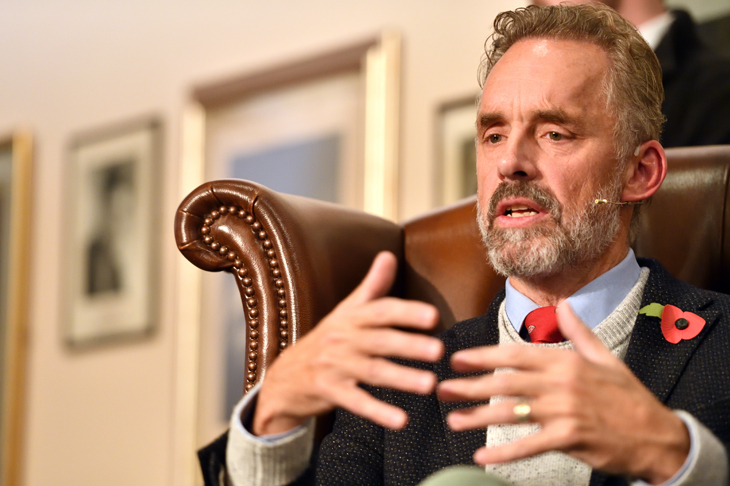 A regular series of rules for life by Pete Shmigel, a former senior state and federal political advisor and CEO of Lifeline Australia.
A regular series of rules for life by Pete Shmigel, a former senior state and federal political advisor and CEO of Lifeline Australia.
It was one of those days.
I could have sworn the hipster barista was friendlier to the younger guy in the queue. Our politicians seemed singularly stupid. There were no good reasons for having been sacked from that job I loved. Nobody is reading my columns because I basically suck.
You name it. My internal soundtrack was only songs of self-criticism and cynicism about the world and every other creature who inhabits it. Okay, besides my ever-patient and loving wife, and my faithful canine, George Costanza.
In this state of glum and gore, I helpfully recalled a tiny reflection by one of the world’s most hated public intellectuals.
When Jordan Peterson last spoke at a packed Sydney Opera House, I went along. At the end of the talk, he took some questions. One fellow doing it tough described his battles with depression.
Peterson took it in, paused and gently asked the man: ‘How’s your sleep lately?’
In my own case, lack of sleep is an absolute slayer of decency, dreams and days. When I don’t rest, I uncontrollably tumble into what the shrinks call a “trauma vortex”. Small re-enactments of the crap moments of a regular life. Solution: get some sleep inta ya, son.
Peterson, based on work with thousands of his own clients as a psychologist and having more empirical data about human behaviour than can be fit on half the spreadsheets in the known galaxy, distils and disseminates simple and understandable solutions. In my case, and perhaps in that of the millions who buy his books, podcasts and tour tickets, those practical prompts help manage both the untidy internal and the overwhelming external realms.
So, why therefore is this nerdy Canadian professor so loathed by some? Why would some of his opponents revel in his recent personal struggles with drug addiction, and point to them as proof of Peterson’s alleged hypocrisy, shortcomings, or failure?
Why in the case of a sunny day in Sydney did not only 3000 ‘normie’ people turn up to hear him talk, but 300 or so other (proudly according to their signs) Lefty people turn up to protest his very presence in Australia? (Peterson reckons it was the biggest protest on his global tour.)
Occasionally, I jump on the internet to monitor the ‘Peterson Hatred Scale’ and whether it’s trending up or down. It’s redundant because, the longer that he’s on the public scene, the intensity of the hatred directed against Peterson seems to constantly climb. However, it’s spiked more recently following the end of his self-imposed exile, his partial recovery from addiction, and his re-entry into public debate with a new book and new series of podcasts with his daughter, Michaela.
The Left and others hate the obvious stuff about Peterson, e.g., his commentary and personal stances on contemporary socio-political issues. He’s a very public and therefore convenient target for those convinced by his limited commentary on politics that he’s a defender of the patriarchy, an opponent of mandatory pronouns, a critic of cancel culture, and a commentator against Left-wing protest movements. (He sees some of the latter as personally wasteful expressions of unresolved and misdirected individual angst).
But political hatred is not unusual nowadays. It’s completely normal to denigrate and dehumanise anyone we disagree with, it seems, and that phenomenon is sadly shared across the ideological spectrum. So, I suggest that there’s something deeper about the anger directed at Peterson.
Whether it’s stated by his enemies or implicit in their approach, Peterson is a massive risk to them at a deeper level than represented by his political views, which are only occasional and easily fit within the tradition of polite, boring and non-rapacious Canadian conservatism.
Indeed, Petersen stands on the wall between a historic Judeo-Christian philosophical outlook, informed by psychology, and post-modernism. Like that Colonel at Gitmo in the movie, he tells us truths that some can’t handle.
Believe in something
Petersen has both his 12 Rules and now his 12 More Rules. But in some ways, the straightforward content of the rules – things like show kindness and make an effort – is less important than their actual existence and accessibility to millions. In the context of shape-shifting social norms, digital frenzy, and micro-tribalism, Petersen prominently puts up the flag of a personal code of conduct.
Millions have noticed this because it’s an exception to the current rule; they live in a world where faith and belief, in general, are seen as outdated if not corrupt and manipulative. In their own way, Peterson’s fellow travellers have made a counter-cultural decision to reject resentment and relativism; they are adopting a concrete codex of personal laws in the face of a confusing blend of abstraction, absolutism and anxiety.
The truth is the Left tends to hate flags, and it sadly can be dismissive of and derogatory toward those that choose to salute them. Those folks are somehow inferior, flawed, uneducated or unaware, or so it goes.
In particular, Peterson’s emphasis on personal responsibility and empowerment runs directly contrary to the contemporary Left’s extended class analysis and its reductionist tropes (e.g., those who have power and privilege, and those who do not; those of colour and those not of colour; those who are male and those who are exploited by males etc). We obligated to somehow identify and then condemn our identity if it’s somehow deemed on the wrong side of history.
Personally, I choose to identify through belief and, ever imperfectly, try to stick to my values and choices. I choose to invest in age-old creeds because, frankly, I’m a terrible swimmer in a swirling sea of self-designed self-help and insidious intersectionality. If I drown, I can’t help others.
Behave
At the core of Peterson’s code is one invocation: behave yourself. Whether it’s in terms of showing empathy toward others or controlling your feelings of envy, we’re counselled to basically show old-fashioned decency and decorum and, very importantly, to interact with people in a polite and positive way.
It’s telling that these quasi-Biblical precepts are an existential threat to some of the Left who now thrive on public and performative conflict. On the campuses where Peterson has spent most of his life, the current mantra for the young is actually the opposite of good behaviour. A whole generation is now intellectually trained by the Left’s academics to misbehave as justified by some concept of equity. It’s become not a long distance to travel from living in a well-mannered and measured way to now being accused that your ‘silence is violence’ and that your quiet life is an active defence and perpetuation of systemic and historic wrongs.
In the US Army, sergeants made crystal clear to me and other grunts that we needed to ‘square our shit away’ and ‘get with the program’. After too many mistakes in the young, male and stupid category, including unkindness to others, I thrived on and matured through the structure and discipline of being camo rather than some self-indulgent self-identification.
Historically, millions of others who have gone through similar rites of passage – defined by learning somebody else’s rules rather than following one’s own ego – also reflect on their importance. Rules from outside ourselves are tools used by our elders to make us proper adults who can help the species go forward. For some on the Left, however, commitment and compliance imply moral servitude or even tolerance of immoral structures and those elites who lead them. If we are not awakened and active, we are somehow guilty, it seems. Marx’s ‘opium of the masses’ riff faintly plays in the background.
But maybe, just maybe, justice starts from being just to those that we live with, work with, live next door to and interact with every day. In some ways, such justice is ‘scarier’: it is intimate, emotionally rich, and direct – say compared to a political meme or a protest banner or a consequence-free critique of the powers that be. As an old guy with family and friends I intensely care about, I know it’s best to take the scary rather than expedient path.
Be humble
Polling in the 1950s to the 2010s shows a massive difference in young people’s views. Less than 20% in the 50s saw themselves as “important”; now, more than 80% see themselves as “important”. Under the guise of self-esteem and positive reinforcement, our culture is now characterised by this kind of pronounced individualism. Schoolkids are taught how to manage their personal brands and create content.
You’d think that the Left would give Peterson a medal for bravely pointing out the flaws of a vanity-based and materialistic culture, and for reminding people that they should act as part of a bigger scheme and look after others in that scheme (called civil society).
Maybe, in their quest to somehow redistribute and realign society, what the Left hates in Peterson is what they might hate in this defence of tradition from Seneca: ‘When we have lost morals, justice, piety and faith, and even a sense of shame, we can never restore them.’
The bottom line is that to some on the Left, Jonathon Petersen isn’t just a political foe. Those come and go. Rather, he’s a dangerous and articulate emissary from a past where shared systems of belief, public standards of behaviour, and personal humility were greater norms. None of those are good preconditions for the cultural war – even as they may be simple rules for a decently-led life.
Got something to add? Join the discussion and comment below.
Get 10 issues for just $10
Subscribe to The Spectator Australia today for the next 10 magazine issues, plus full online access, for just $10.


























Comments
Don't miss out
Join the conversation with other Spectator Australia readers. Subscribe to leave a comment.
SUBSCRIBEAlready a subscriber? Log in